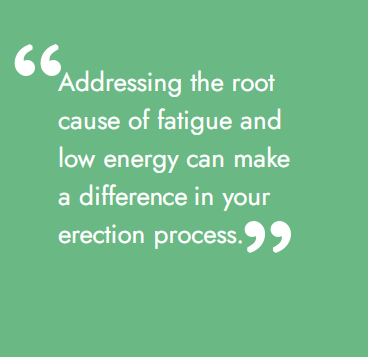Listen to The Psychology of Erectile Dysfunction through our podcast player above or read the transcript here [PDF].

Erectile dysfunction (ED) can be caused by non-physical factors. Factors in your life including thoughts, feelings and relationships can lead to erectile dysfunction. This is often called psychogenic erectile dysfunction. The word psychogenic means the origins of something are mental or psychological.
There are many ways to label erectile dysfunction. One approach is to separate ED into three distinct categories. This breakdown will help you better think about and ultimately address erectile dysfunction. These three categories are:
- Organic ED
- A Mix of Psychogenic ED and Organic ED
- Psychogenic ED
Psychogenic ED
Erectile dysfunction with origins that are completely psychological, or mental in nature, is psychogenic. Psychogenic erectile dysfunction makes up roughly 10% to 20% of all ED cases.
If you are generally young and healthy, there is a strong possibility that your erectile dysfunction is psychogenic.
Organic ED
The second category is organic erectile dysfunction. Organic ED means there is a strong biological, neurogenic, or other medical basis causing your erectile dysfunction.
80% to 90% of all erectile dysfunction cases are thought to be organic in nature. There are a number of ways a doctor can identify or rule out some specific medical causes. Other factors may be more difficult to identify.
A Mix of Psychogenic and Organic ED
The third category is a mix between psychogenic and organic factors. This mixed category probably accounts for the vast majority of cases, meaning that most cases of ED are not purely psychogenic and they are not purely organic. It is likely there are factors from both your physical and psychological states that are contributing to your erectile dysfunction.
ED is Viewed through a ‘Binary Lens’
There is a tendency to assume that ED has a singular cause. It’s easier to think about that way. It’s also easier to treat. We like things simple and clear. There are also historical reasons why most men assume the only approach to fixing ED is through medication.
Through the early 1990s, erectile dysfunction was considered to be a mental condition. It was assumed that at least 90% of erectile dysfunction cases were mental or psychological. Effective medications for treating erectile dysfunction that emerged in the late 1990s changed the thinking about erectile dysfunction. Most cases of ED were now considered to be organic, with only 10% to 20% now being considered psychological.
The working assumption was that there must be a singular cause of ED. This continues to impact the way we think about ED today. The dramatic shift in thinking from psychogenic ED to organic ED, primarily because of the arrival of VIAGRA® (sildenafil citrate) in the late 1990s, is probably not a fair and true way of addressing erectile dysfunction.
Try our eCourse: "The Thinking Man’s Guide to Understanding and Addressing ED"
Notably, psychological and behavioral treatment in the decades prior to VIAGRA® reported very high rates of success with helping men resolve ED. Of course, those treatments were more challenging than taking a pill, which may be why they became a less popular option.
Currently, medical and mental health professionals are beginning to view conditions such as ED as more complex. It is likely that almost every situation of erectile dysfunction involves parts of your psychology and environment. This means that addressing those factors will put you in a better position to have better erections.
ED Treatment for the Three Categories
Psychogenic erectile dysfunction implies that the causes of your ED are purely psychological. This most commonly occurs in younger men who are generally healthy. Treatment of pure psychogenic ED can be rather quick. It can yield positive results without having to use any medications or surgery. This generally involves talk therapy or self-help processes.

ED that is caused be a mix of psychogenic and organic factors is possibly the most common occurrence. Treatment generally involves a combination of medication and psychological interventions. The combination of treatment is likely to get the best results.
Even if you respond to the medication alone, that is likely only a partial solution. You will still benefit from improving psychogenic and environmental factors to improve consistency and overall satisfaction. This will also help if medication becomes less reliable in the future.
Medical intervention should be a part of treatment, and psychological interventions alone would not be effective, if your ED has a strong organic basis.
Erectile dysfunction can be very distressing for men. Even with appropriate medical solutions, anxiety, fears, and the negative impact ED has on relationships can persist. Almost all men with organically-based ED will benefit from understanding more about the role of their brain in their erection process.
No matter what is causing your ED, your brain will continue to play a crucial role in the solution.
Your erectile dysfunction may have organic components to it but addressing the organic components alone can leave many potential benefits and solutions unaddressed. With an issue as important as an erection, you should not leave anything on the table. With a little investment in understanding the mental side your ED, you can find a lasting solution that works best for you.
Ready to Learn More?
To start your in-depth approach to resolving ED, try our online learning course called BEYOND THE LITTLE BLUE PILL, The Thinking Man’s Guide to Understanding and Addressing ED.
Ready to talk to an ED expert? Erection IQ founder Mark Goldberg helps men resolve erectile dysfunction. He offers individual, one-on-one services to men throughout the world through a secure, telehealth platform. It’s 100% confidential. You can visit the Center for Intimacy, Connection and Change website to schedule a free consult with Mark.
Subscribe to our Podcast
All Erectile Dysfunction Radio Podcast episodes categorized by topic are now available. Or find and subscribe to us for free on Apple Podcast/iTunes, Spotify and YouTube.
Article Updated – March 2021


